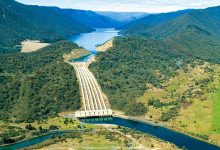The NSW government will fast-track planning approvals for the Snowy 2.0 project, as premier Gladys Berejiklian looks for major infrastructure projects that can be used to stimulate the NSW economy impacted by Covid-19.
Snowy 2.0 topped the list of 24 projects that will now be fast-tracked through the planning assessment process in an effort to stimulate new infrastructure investment in New South Wales.
“By fast-tracking assessments, we will keep people in jobs and keep the construction industry moving as we ride out the COVID-19 pandemic and set our sights on economic recovery,” Berejiklian said in a statement.
NSW planning minister Rob Stokes said that he expected the first approvals of projects under the accelerated assessment process could occur within the month.
The NSW government’s fast tracked projects, which also includes residential construction, school upgrades and local council infrastructure would stimulate more than $7.5 billion in new investment, and create 9,500 new jobs.
Of this amount, the NSW government expects the Snowy 2.0 will generate at least $4.6 billion in new investment, as well as create as many as 2,000 new jobs in the state. It is by far the largest infrastructure project in the first tranche of accelerated approvals.
“This will mean shovel-ready projects can get underway and the construction pipeline can continue to grow,” Mr Stokes said. “If approved, these projects will be a win-win for NSW: delivering jobs for today, and local community and business benefits tomorrow.”
Stokes stressed that while the approvals process will be accelerated, the NSW government expects that the same level of planning oversight will still be given to each of the proposed projects.
“It’s important to note that this is not a greenlighting exercise, the same stringent checks, balances and community consultation that ensures transparency, public benefit and merit-based assessment of projects remain.”
The NSW government expects to announce further rounds of accelerated planning approval processes in coming months, as it sees speeding up the planning processes could unlock new investment in the state, and stimulate ongoing economic activity at a crucial time.
The Snowy 2.0 upgrade was the only energy project to make the first tranche of fast-tracked projects, but will be joined by TransGrid’s proposed $285 million “Powering Sydney’s Future” project, which will see upgrades to electricity network infrastructure throughout the Sydney CBD and surrounding suburbs, including substation upgrades and new underground distribution networks.
“We know our planning system will be a key lever in driving investment in NSW as we come out of this crisis,” NSW treasurer Dominic Perrottet added. “NSW already has the country’s biggest infrastructure program and we need to do what we can now to make sure that continues.”
Planning applications for the Snowy 2.0 project were lodged with the NSW planning department in June 2019, and are currently being assessed as a State Significant Infrastructure project.
The project will involve an expansion to Snowy Hydro’s generation capacity of as much as 2,000MW, along with the construction of a 26 kilometre tunnel linking the Tantangara and Talbingo reservoirs. Once completed, the project is expected to deliver as much as 350,000MWh of pumped-hydro energy storage capacity.
The NSW department of planning recently granted planning approval for the establishment of a tunnel segment factory in Cooma. The factory will prepare 130,000 concrete segments that will line the new Snowy 2.0 tunnels.
The Snowy 2.0 project has faced calls for work to be halted, led by the National Parks Association of NSW, which has called for the project to undergo an independent assessment of its economic benefits and environmental impacts, which the association says do not stack up.
The National Parks Association has produced an analysis of the proposed expansion to the Snowy Hydro scheme, which prompted it to label the project as the “worst possible project in the worst possible location“, due to understated costs and environmental impacts.
A group of more than two dozen energy and planning experts joined the calls for work to be halted on the Snowy 2.0 project, raising concerns that the environmental impacts the project would have on the Kosciuszko National Park could not be mitigated.
The Snowy 2.0 project was the brainchild of former prime minister Malcolm Turnbull, who cites the project as the “single most important” contribution he made to energy policy while leader.
Under Turnbull, the Federal government bought out the shares in Snowy Hydro that were previously held by the Victorian and New South Wales governments, with the federal government now holding complete ownership over the scheme.
The NSW developed the first tranche of 24 projects based on a series of three essential criteria; that the projects will create jobs in NSW, that a planning approval decision can be made within six months and that the project would deliver public benefits.
The fast-tracked projects will follow upgrades to the transmission network interconnector between New South Wales and Queensland, which received fast-tracked approval from the Australian Energy Regulator on Tuesday, allowing for an additional 190MW of electricity to be shared between the two states.
RenewEconomy and the Smart Energy Council will be co-hosting a “virtual conference” on May 6, focusing on a renewables-led economic recovery, featuring industry leaders, analysts and advocates. More information and registration here.
RenewEconomy and its sister sites One Step Off The Grid and The Driven will continue to publish throughout the Covid-19 crisis, posting good news about technology and project development, and holding government, regulators and business to account. But as the conference market evaporates, and some advertisers pull in their budgets, readers can help by making a voluntary donation here to help ensure we can continue to offer the service free of charge and to as wide an audience as possible. Thankyou for your support.










